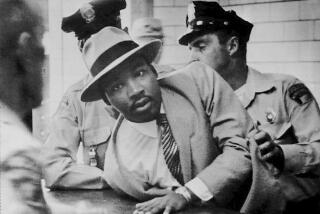Noble Goals, Base Pursuits
- Share via
So, even Thomas Jefferson was human. Now, thanks to the same DNA testing employed to expose Bill Clinton’s frailties, we learn that the author of the Declaration of Independence and third president of the United States fathered a child with a slave. It is reassuring, indeed liberating, news that the loftiest and most inspirational American of them all was also torn by the torments and rewards of more base pursuits.
“How will we tell our children?” the sanctimonious howled when Clinton was revealed to be all too human. And now they have the much more difficult task of dealing with a founding father who fathered a child out of wedlock and evidently loved, or at least made love with, a woman who was most certainly not his wife and who was inappropriately young--perhaps only 14, and 28 years his junior--when the liaison began. Well, just deal with it, honestly and forthrightly.
Perhaps we’ll begin at last to treat our heroes as the complex human animals they’ve always been, driven by lust as well as idealism, capable of immoral disarray in their personal lives while performing perfectly on the public stage. They should still be heroes for what they accomplished, but they should never be worshiped as idols.
From Alexander Hamilton through Franklin Delano Roosevelt to the Rev. Martin Luther King Jr., many of the most worthy of people have failed to live up to standards that respectable society pretended to require. Pretended, because it was always known that unbridled sexual appetite was an omnipresent part of the norm. For that reason, the consensus of the establishment, until the empowerment of Kenneth Starr, was to leave such matters securely tucked away out of public sight in the realm of the personal. As Ronald Reagan once told me, quoting from the trials of Oscar Wilde, “I have no objection to anyone’s sex life, so long as they don’t practice it in the street and frighten the horses.”
That standard should apply to Jefferson’s life, and it’s tempting to bemoan the work of those who utilized DNA testing in what amounts to a posthumous expose of this properly venerated man. Why, indeed, do we need to muck about the lower depths in the life of one of America’s most revered? Shouldn’t it be enough to postulate that even the most respected lead lives that embrace embarrassing and awkward detail?
Except that these awkward details concern not sex, but slavery. This is further evidence that Jefferson exploited slavery in practice even as he bemoaned it as an affront to God in his theoretical writings. Jefferson not only owned slaves but, as was so often the practice of white Southern gentility, engaged in a form of legal rape so common as to call into question the patrimony of huge swaths of future generations. After all, the slave, Sally Hemings, was Jefferson’s wife’s half-sister.
This is the more important consequence of the confirmation of Jefferson’s relation to Hemings, his “property” from the age of 3. It becomes an occasion to visit the implications of slavery, that brutal caldron whose bitter brew indelibly stains our national life to this day. Clinton has asked for a dialogue on race, but it will be a dialogue of the deaf as long as it fails to come to grips with the fundamental contradiction of this nation--that men like Jefferson, who did so much to advance the cause of liberty, where themselves the enslavers of others.
This country’s prime mythology is based on the absurdity that a group of intellectually and morally superior white males were given to a civic virtue never blemished by greed, hate, lust or meanness. But the unpleasant truth is that all such elements were present in abundance and found respectable expression in racism, which, beginning with the destruction of the native population, has been a defining American experience.
Our most sacred document, the U.S. Constitution, enshrines the principle of slavery, as do key passages of the scripture that forms our Judeo-Christian heritage. Of course, there is much more in this heritage that is ennobling and has allowed us to transcend literal restrictions on the human spirit. That’s why we can speak of a “living” constitution, and why most serious theologians advance a nonliteral view of religious texts, regarding them in historical context.
Jefferson’s voluminous writings on both practical and philosophical issues form a key component of our received source of wisdom. They should continue to be regarded as such. But it’s best to read all such works keeping in mind that the men who wrote them were mere mortals capable of being both saints and sinners.


